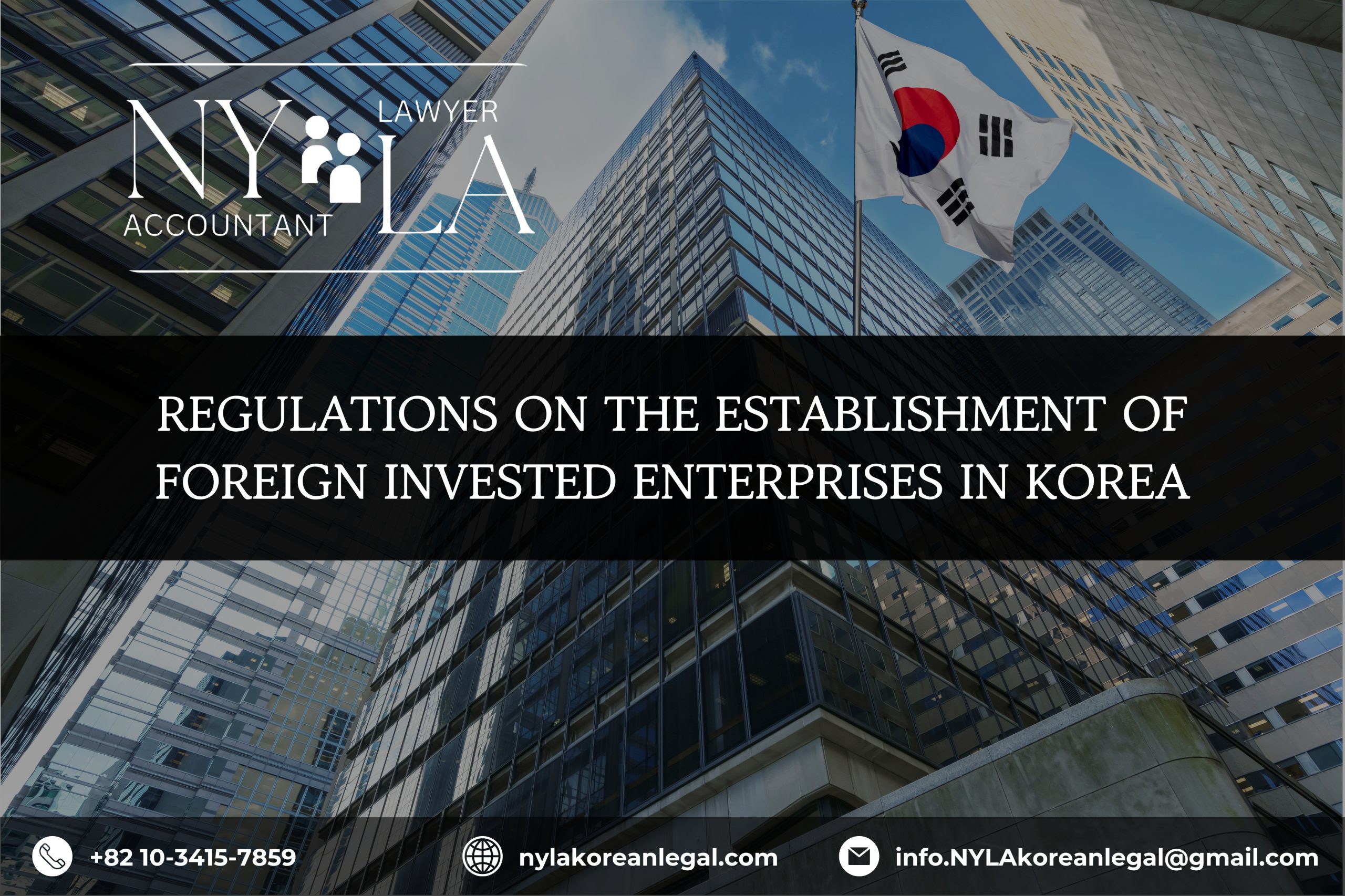Over the past decade, Korea has consistently ranked among the world’s top 15 economies in terms of foreign direct investment inflows. Major corporations such as Google, Apple, Samsung, as well as numerous small and medium-sized enterprises from Europe, the United States, and Southeast Asia, have chosen Seoul and other major cities as locations for their offices.
However, contrary to the common perception that having “capital” alone is sufficient to establish a company, Korean law sets forth clear provisions regarding the conditions, procedures, and limitations applicable to foreign investors. This article aims to provide you with a comprehensive yet accessible overview, offering sufficient detail to help you prepare before commencing business in the Korean market.
Summary
- I. Legal basis
- II. Types of business entities allowed for establishment
- III. Capital contribution and shareholding requirements
- IV. Procedure for establishing a company
- V. Restricted industries for foreign investment
- VI. Incentives and support
- VII. Penalties for violations
- VIII. Conclusion
- IX. About NYLA – Korean Legal Office
I. Legal basis
The establishment of foreign-invested companies is governed by three principal groups of laws:
- Foreign Investment Promotion Act (FIPA): Regulations on the definition of foreign direct investment, capital and ownership requirements, investment incentives, and sanctions for non-compliance.
- Commercial Act: Regulating the types of business entities, the structure of corporate governance, and the duties of shareholders and directors.
- Decrees and implementing guidelines issued by the Ministry of Trade, Industry and Energy (MOTIE).
In addition, the national investment promotion agency, Invest KOREA (under KOTRA), plays a supportive role in administrative procedures and provides information to foreign investors.
II. Types of business entities allowed for establishment
Foreign investors may choose from the following forms of business entities:
- Joint-Stock Company (JSC): suitable for large-scale projects with multiple shareholders.
- Limited Liability Company (LLC): commonly adopted by small and medium-sized enterprises, with fewer shareholders and a simpler management structure.
- Branch Office: established when a foreign parent company intends to conduct business directly in Korea. A branch office is assigned a tax identification number, and it is permitted to enter into contracts and issue tax invoices.
- Representative Office: limited to market research and liaison activities; it is not permitted to engage in profit-generating business. For example, a Vietnamese company seeking to survey the cosmetics market in Seoul may establish a representative office, but it may not conduct direct sales.
Under the Foreign Investment Promotion Act (FIPA), in order to qualify as foreign direct investment (FDI):
- Minimum capital requirement: KRW 100 million (approximately USD 70,000–90,000).
- Ownership threshold: the foreign investor must hold at least 10% of the voting shares.
Example: If an investor contributes KRW 50 million and holds 5% of the shares, the company may still be established, but it will not be recognized as FDI. Consequently, the investor will not be eligible to apply for a D-8 investor visa or to benefit from tax incentives.

IV. Procedure for establishing a company
A standard procedure typically includes:
- Filing a foreign investment report with a designated bank or KOTRA. This is a mandatory step to record the inflow of capital from abroad.
- Remittance of capital into a temporary account. The bank will issue a capital confirmation certificate.
- Registration of corporate establishment with the Court. The processing time is approximately 2–3 weeks. The application dossier includes: the company’s Articles of Association, the list of shareholders, and duly legalized personal documents.
- Tax registration with the National Tax Service (NTS) to obtain a tax identification number and to declare VAT and corporate income tax (CIT) obligations.
- Opening an official corporate bank account in the company’s name and transferring the capital from the temporary account.
If the enterprise operates in a sector requiring a special license (e.g., banking, education, healthcare), additional approval must be obtained from the competent regulatory authority.
V. Restricted industries for foreign investment
Certain sectors remain restricted to foreign capital, for example:
- Agriculture: in particular, rice cultivation – entirely prohibited for foreign investment.
- Media and press: subject to foreign ownership restrictions.
- Banking and finance: subject to separate approval requirements, with foreign equity participation capped.
- Defense and core technologies: require prior approval from MOTIE and the national security authorities.
VI. Incentives and support
Korea offers various incentive policies to attract FDI:
- The D-8 visa allows investors and their families to reside and work in Korea on a long-term basis.
- Enterprises located in a Free Economic Zone (FEZ) are eligible for corporate income tax exemptions and reductions during the initial years of operation, as well as exemptions and reductions on land lease fees.
- Invest KOREA provides comprehensive from A to Z support: including industry information, legal guidance, visa assistance, and dispute resolution services.
VII. Penalties for violations
The Korean legal system also clearly stipulates the responsibilities:
- Failure to report investment: may result in a fine of up to 10 million KRW.
- Unauthorized investment in the defense sector: may lead to the loss of voting rights and compulsory transfer of shares.
- Serious violations: may be subject to imprisonment of up to 1 year or heavier fines.
In addition, investors have the right to file an administrative lawsuit if they disagree with a decision made by a government authority, within 90 days from the date of such decision.
VIII. Conclusion
The establishment of a foreign-invested enterprise in Korea presents both opportunities and challenges. Investors can access a vast market and take advantage of various incentives, but they must strictly comply with legal regulations to avoid risks. Thorough preparation and a well-defined legal strategy will help businesses operate safely and sustainably when entering the Korean market.
IX. About NYLA – Korean Legal Office

■ NYLA – Your Trusted Legal Partner in Korea
At NYLA, we understand that the success of foreign businesses in Korea requires not only a solid business strategy but also reliable legal support. With a team of experienced Korean attorneys and legal professionals, NYLA provides tailored legal services for companies, investors, and individuals operating or planning to establish a presence in Korea.
We support our clients throughout the entire business journey with comprehensive services, including:
- Legal consultation on company establishment, taxation, and immigration;
- Advice on commercial real estate, franchising, and product distribution;
- Support in human resources, marketing, and business strategy.
In addition to legal advisory, NYLA also represents clients in civil litigation cases related to business, labor, marriage, family, and inheritance to ensure their rights and interests are fully protected.
■ Contact NYLA

If you’re a foreign business or individual looking for a reliable legal partner in Korea, NYLA is here to help. We are committed to delivering effective, practical, and personalized legal solutions for every client.
With a proven track record of assisting hundreds of international clients, our team is equipped to help you navigate complex legal challenges—whether it’s commercial disputes, contract issues, or foreign investment guidance.
Don’t let legal matters hold you back. Let NYLA be your trusted guide in the Korean market.
■ Get in touch with NYLA for expert legal support
| Website: https://nylakoreanlegal.com/
FB: https://www.facebook.com/nyla.koreanlegal Tiktok: https://www.tiktok.com/@nylakoreanlegal Youtube: https://www.youtube.com/@NYLA-xd8qx Email: info.NYLAkoreanlegal@gmail.com SĐT: +82 10-3415-7859 |
 |






















































